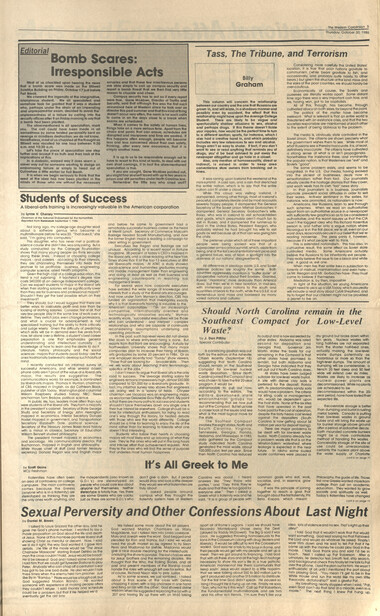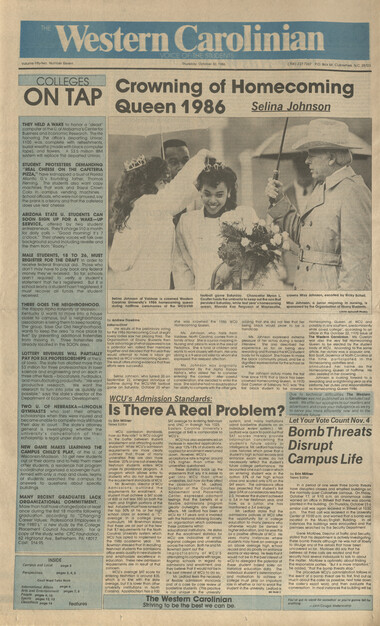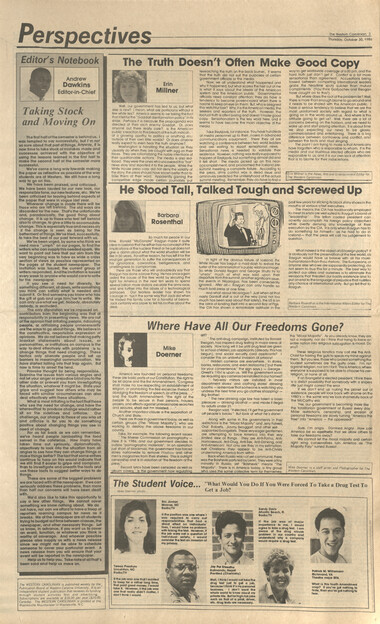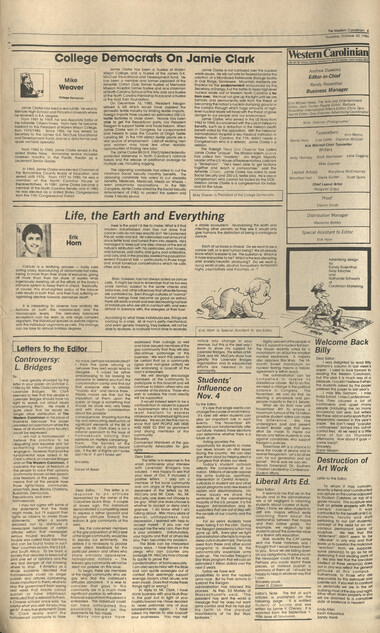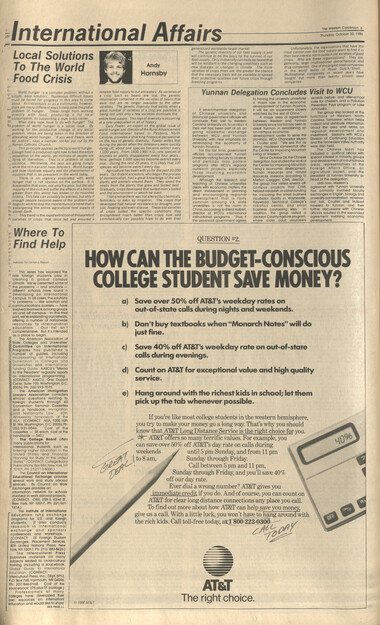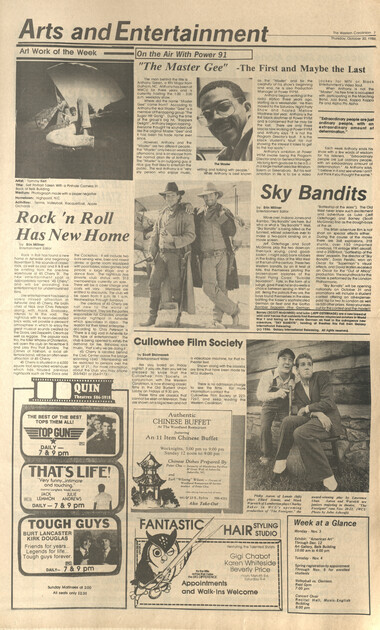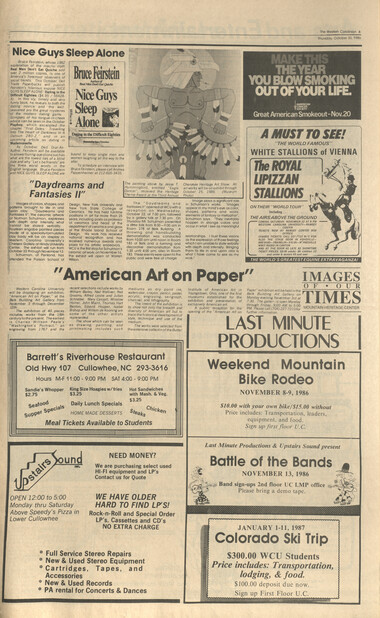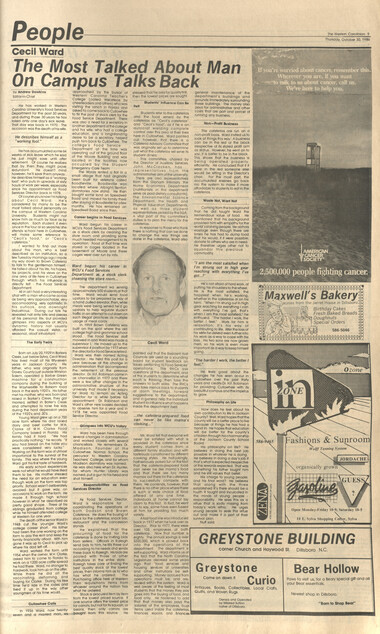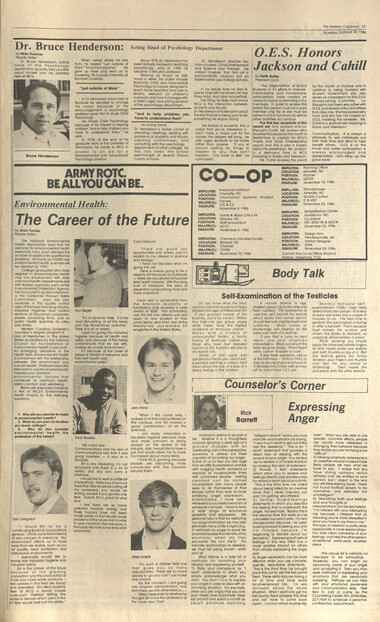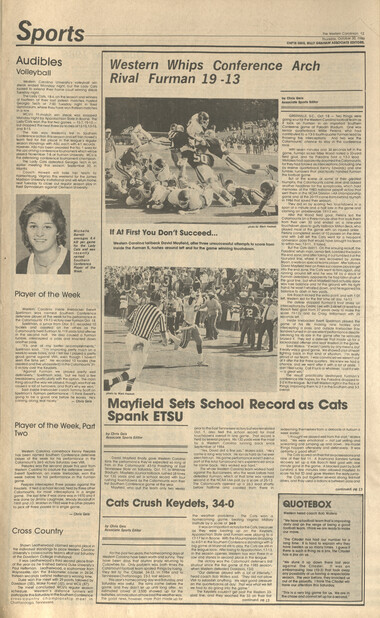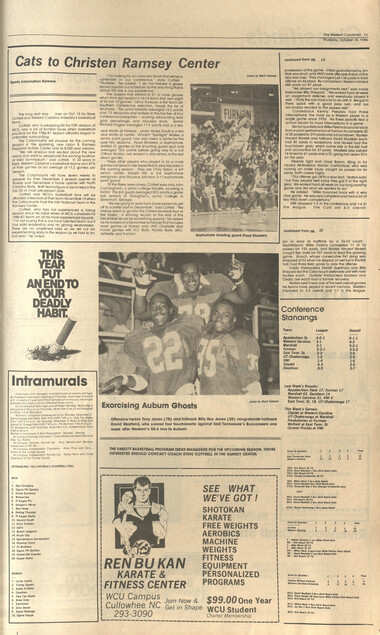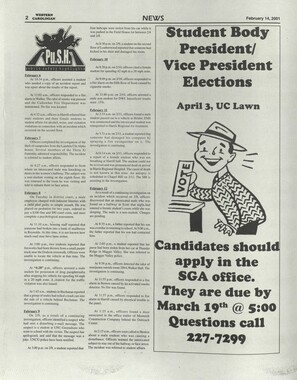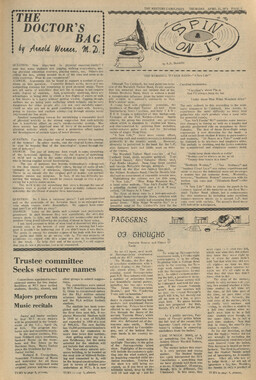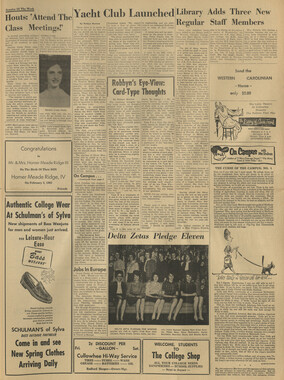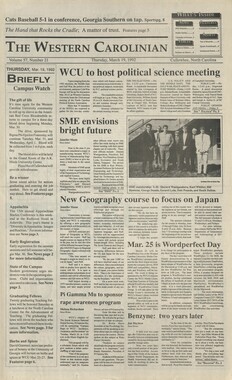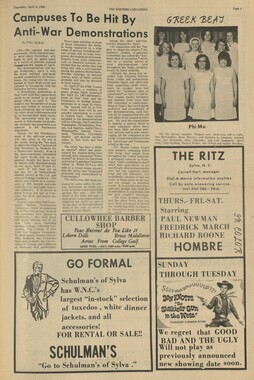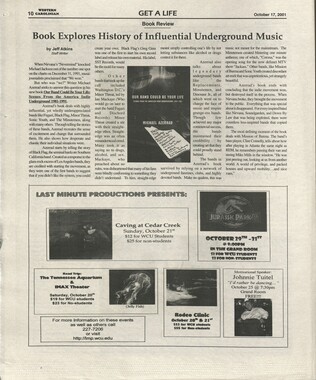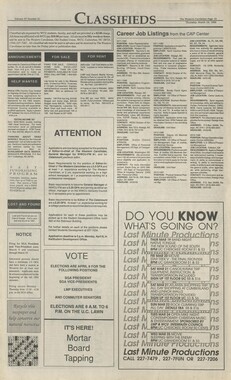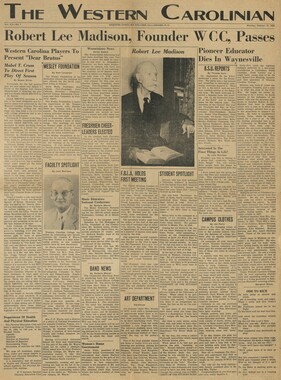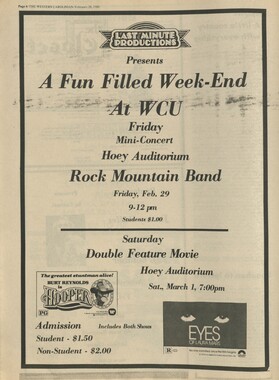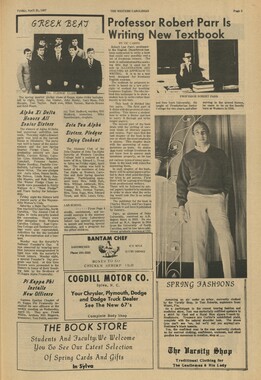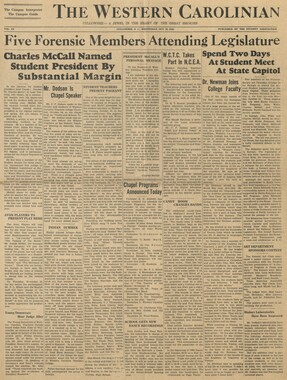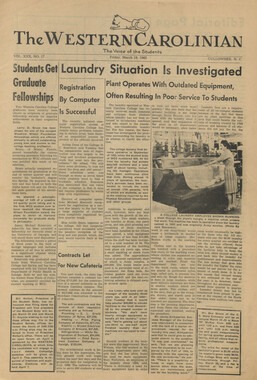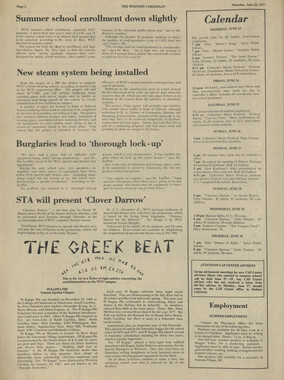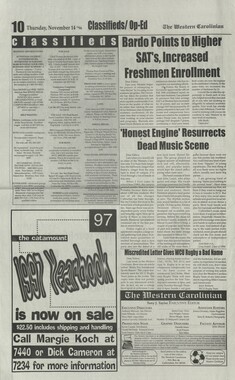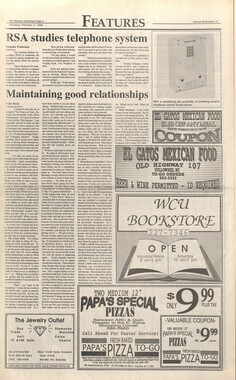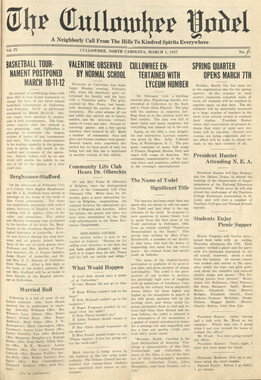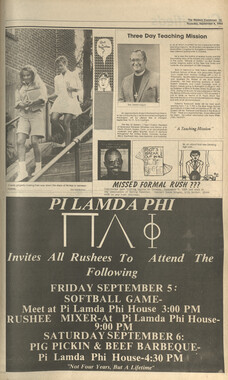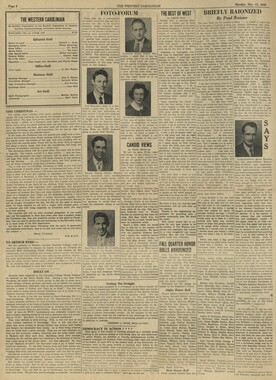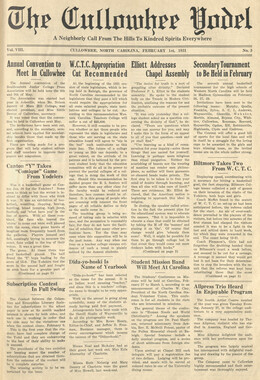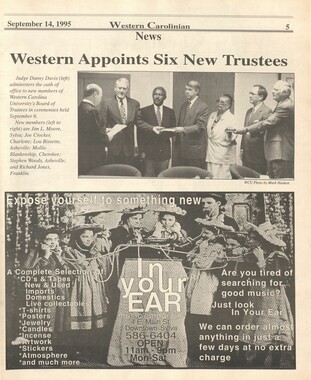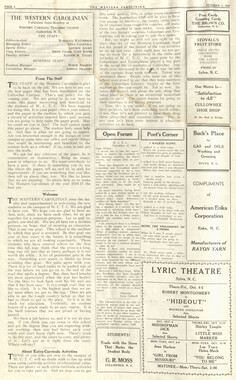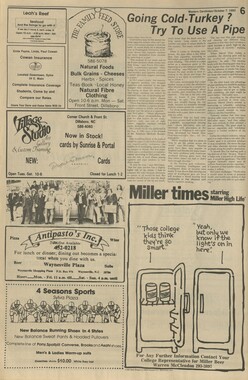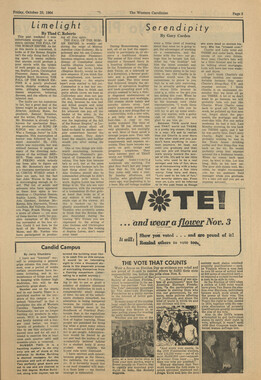Western Carolina University (20)
View all
- Canton Champion Fibre Company (2308)
- Cherokee Traditions (293)
- Civil War in Southern Appalachia (165)
- Craft Revival (1942)
- Great Smoky Mountains - A Park for America (2767)
- Highlights from Western Carolina University (430)
- Horace Kephart (941)
- Journeys Through Jackson (154)
- LGBTQIA+ Archive of Jackson County (26)
- Oral Histories of Western North Carolina (314)
- Picturing Appalachia (6772)
- Stories of Mountain Folk (413)
- Travel Western North Carolina (160)
- Western Carolina University Fine Art Museum Vitreograph Collection (129)
- Western Carolina University Herbarium (92)
- Western Carolina University: Making Memories (708)
- Western Carolina University Publications (2283)
- Western Carolina University Restricted Electronic Theses and Dissertations (146)
- Western North Carolina Regional Maps (71)
- World War II in Southern Appalachia (131)
University of North Carolina Asheville (6)
View all
- Allanstand Cottage Industries (62)
- Appalachian National Park Association (53)
- Bennett, Kelly, 1890-1974 (1388)
- Berry, Walter (76)
- Brasstown Carvers (40)
- Carver, George Washington, 1864?-1943 (26)
- Cathey, Joseph, 1803-1874 (1)
- Champion Fibre Company (233)
- Champion Paper and Fibre Company (297)
- Cherokee Indian Fair Association (16)
- Cherokee Language Program (22)
- Crowe, Amanda (40)
- Edmonston, Thomas Benton, 1842-1907 (7)
- Ensley, A. L. (Abraham Lincoln), 1865-1948 (275)
- Fromer, Irving Rhodes, 1913-1994 (70)
- George Butz (BFS 1907) (46)
- Goodrich, Frances Louisa (120)
- Grant, George Alexander, 1891-1964 (96)
- Heard, Marian Gladys (60)
- Kephart, Calvin, 1883-1969 (15)
- Kephart, Horace, 1862-1931 (313)
- Kephart, Laura, 1862-1954 (39)
- Laney, Gideon Thomas, 1889-1976 (439)
- Masa, George, 1881-1933 (61)
- McElhinney, William Julian, 1896-1953 (44)
- Niggli, Josephina, 1910-1983 (10)
- North Carolina Park Commission (105)
- Osborne, Kezia Stradley (9)
- Owens, Samuel Robert, 1918-1995 (11)
- Penland Weavers and Potters (36)
- Roberts, Vivienne (15)
- Roth, Albert, 1890-1974 (142)
- Schenck, Carl Alwin, 1868-1955 (1)
- Sherrill's Photography Studio (2565)
- Southern Highland Handicraft Guild (127)
- Southern Highlanders, Inc. (71)
- Stalcup, Jesse Bryson (46)
- Stearns, I. K. (213)
- Thompson, James Edward, 1880-1976 (226)
- United States. Indian Arts and Crafts Board (130)
- USFS (683)
- Vance, Zebulon Baird, 1830-1894 (1)
- Weaver, Zebulon, 1872-1948 (58)
- Western Carolina College (230)
- Western Carolina Teachers College (282)
- Western Carolina University (1794)
- Western Carolina University. Mountain Heritage Center (18)
- Whitman, Walt, 1819-1892 (10)
- Wilburn, Hiram Coleman, 1880-1967 (73)
- Williams, Isadora (3)
- Cain, Doreyl Ammons (0)
- Crittenden, Lorraine (0)
- Rhodes, Judy (0)
- Smith, Edward Clark (0)
- Appalachian Region, Southern (2399)
- Asheville (N.C.) (1917)
- Avery County (N.C.) (26)
- Blount County (Tenn.) (161)
- Buncombe County (N.C.) (1671)
- Cherokee County (N.C.) (283)
- Clay County (N.C.) (555)
- Graham County (N.C.) (233)
- Great Smoky Mountains National Park (N.C. and Tenn.) (510)
- Haywood County (N.C.) (3522)
- Henderson County (N.C.) (70)
- Jackson County (N.C.) (4692)
- Knox County (Tenn.) (25)
- Knoxville (Tenn.) (12)
- Lake Santeetlah (N.C.) (10)
- Macon County (N.C.) (420)
- Madison County (N.C.) (211)
- McDowell County (N.C.) (39)
- Mitchell County (N.C.) (132)
- Polk County (N.C.) (35)
- Qualla Boundary (981)
- Rutherford County (N.C.) (76)
- Swain County (N.C.) (2113)
- Transylvania County (N.C.) (247)
- Watauga County (N.C.) (12)
- Waynesville (N.C.) (73)
- Yancey County (N.C.) (72)
- Aerial Photographs (3)
- Aerial Views (60)
- Albums (books) (4)
- Articles (1)
- Artifacts (object Genre) (228)
- Bibliographies (1)
- Biography (general Genre) (2)
- Cards (information Artifacts) (38)
- Clippings (information Artifacts) (191)
- Crafts (art Genres) (622)
- Depictions (visual Works) (21)
- Design Drawings (1)
- Drawings (visual Works) (184)
- Envelopes (73)
- Facsimiles (reproductions) (1)
- Fiction (general Genre) (4)
- Financial Records (12)
- Fliers (printed Matter) (67)
- Glass Plate Negatives (381)
- Guidebooks (2)
- Internegatives (10)
- Interviews (812)
- Land Surveys (102)
- Letters (correspondence) (1013)
- Manuscripts (documents) (619)
- Maps (documents) (177)
- Memorandums (25)
- Minutes (administrative Records) (59)
- Negatives (photographs) (5835)
- Newsletters (1285)
- Newspapers (2)
- Occupation Currency (1)
- Paintings (visual Works) (1)
- Pen And Ink Drawings (1)
- Periodicals (193)
- Personal Narratives (10)
- Photographs (12976)
- Plans (maps) (1)
- Poetry (7)
- Portraits (1960)
- Postcards (329)
- Programs (documents) (151)
- Publications (documents) (2237)
- Questionnaires (65)
- Scrapbooks (282)
- Sheet Music (2)
- Slides (photographs) (402)
- Songs (musical Compositions) (2)
- Sound Recordings (796)
- Specimens (92)
- Speeches (documents) (15)
- Tintypes (photographs) (8)
- Transcripts (322)
- Video Recordings (physical Artifacts) (23)
- Vitreographs (129)
- Text Messages (0)
- A.L. Ensley Collection (275)
- Appalachian Industrial School Records (7)
- Appalachian National Park Association Records (336)
- Axley-Meroney Collection (2)
- Bayard Wootten Photograph Collection (20)
- Bethel Rural Community Organization Collection (7)
- Blumer Collection (5)
- C.W. Slagle Collection (20)
- Canton Area Historical Museum (2110)
- Carlos C. Campbell Collection (282)
- Cataloochee History Project (65)
- Cherokee Studies Collection (4)
- Daisy Dame Photograph Album (5)
- Daniel Boone VI Collection (1)
- Doris Ulmann Photograph Collection (112)
- Elizabeth H. Lasley Collection (1)
- Elizabeth Woolworth Szold Fleharty Collection (4)
- Frank Fry Collection (95)
- George Masa Collection (173)
- Gideon Laney Collection (452)
- Hazel Scarborough Collection (2)
- Hiram C. Wilburn Papers (28)
- Historic Photographs Collection (236)
- Horace Kephart Collection (861)
- Humbard Collection (33)
- Hunter and Weaver Families Collection (1)
- I. D. Blumenthal Collection (4)
- Isadora Williams Collection (4)
- Jesse Bryson Stalcup Collection (47)
- Jim Thompson Collection (224)
- John B. Battle Collection (7)
- John C. Campbell Folk School Records (80)
- John Parris Collection (6)
- Judaculla Rock project (2)
- Kelly Bennett Collection (1407)
- Love Family Papers (11)
- Major Wiley Parris Civil War Letters (3)
- Map Collection (12)
- McFee-Misemer Civil War Letters (34)
- Mountain Heritage Center Collection (4)
- Norburn - Robertson - Thomson Families Collection (44)
- Pauline Hood Collection (7)
- Pre-Guild Collection (2)
- Qualla Arts and Crafts Mutual Collection (12)
- R.A. Romanes Collection (681)
- Rosser H. Taylor Collection (1)
- Samuel Robert Owens Collection (94)
- Sara Madison Collection (144)
- Sherrill Studio Photo Collection (2558)
- Smoky Mountains Hiking Club Collection (616)
- Stories of Mountain Folk - Radio Programs (374)
- The Reporter, Western Carolina University (510)
- Venoy and Elizabeth Reed Collection (16)
- WCU Gender and Sexuality Oral History Project (32)
- WCU Mountain Heritage Center Oral Histories (25)
- WCU Oral History Collection - Mountain People, Mountain Lives (71)
- WCU Students Newspapers Collection (1744)
- Western North Carolina Tomorrow Black Oral History Project (69)
- William Williams Stringfield Collection (2)
- Zebulon Weaver Collection (109)
- African Americans (390)
- Appalachian Trail (35)
- Artisans (521)
- Cherokee art (84)
- Cherokee artists -- North Carolina (10)
- Cherokee language (21)
- Cherokee pottery (101)
- Cherokee women (208)
- Church buildings (167)
- Civilian Conservation Corps (U.S.) (110)
- College student newspapers and periodicals (1830)
- Dams (103)
- Dance (1023)
- Education (222)
- Floods (61)
- Folk music (1015)
- Forced removal, 1813-1903 (2)
- Forest conservation (220)
- Forests and forestry (1058)
- Gender nonconformity (4)
- Great Smoky Mountains National Park (N.C. and Tenn.) (181)
- Hunting (38)
- Landscape photography (10)
- Logging (103)
- Maps (84)
- Mines and mineral resources (8)
- North Carolina -- Maps (18)
- Paper industry (38)
- Postcards (255)
- Pottery (135)
- Railroad trains (71)
- Rural electrification -- North Carolina, Western (3)
- School integration -- Southern States (2)
- Segregation -- North Carolina, Western (5)
- Slavery (5)
- Sports (452)
- Storytelling (245)
- Waterfalls -- Great Smoky Mountains (N.C. and Tenn.) (66)
- Weaving -- Appalachian Region, Southern (280)
- Wood-carving -- Appalachian Region, Southern (328)
- World War, 1939-1945 (173)
Western Carolinian Volume 52 Number 11, October 30, 1986
Item
Item’s are ‘child’ level descriptions to ‘parent’ objects, (e.g. one page of a whole book).
-
-
The Western Carolinian5 Thursday, October 30, 1986 Editorial Bomb Scares: Irresponsible Acts Most of us chuckled upon hearing the news that a bomb scare was made on the Stilwell Science Building on Friday, October 17 Just before Fall Break. We cheered the ingenuity of the imaginative, anonymous student. We all speculated and somehow took tor granted that if was a student who, perhaps under the strain of an impending and unprepared-tor exam, decided to avoid the unpleasantness of a failure by calling Info the security offices after 9 on Friday morning to say that a bomb had .been planted. The aforementioned is ail speculation, mark you. The call could have been made In all earnestness by some twisted personality bent on revenge or mindless destruction; we do not know. Nonetheless, most of us chuckled at the thought as Stilwell was vacated for one hour between 9:30 a.m. and 10:30 a.m. Lef s take Ihe piece of speculation one step further and accept if as truth and then look at the implications of this. In a diabolic, warped way it does seem a clever way out for someone wanting to dodge an embarrasing failure or simply to head out of Cullowhee a little earlier for Fall Break. if is when we begin seriously to think that the seed of the idea has now been planted In the minds of those who ore without the necessary scruples and that these few mischievous persons are able simply to call up campus security and report a bomb threat that we then find very little reason to chuckle and cheer. Campus security has to act as if every report were true. Gene McAbee, Director of Traffic and Security, said that although this was the first such occurance here at Western since he took over as director this past summer and that this kind of thing doesn't occur very often, the norm is for such calls to come in on the days close to a break when exams are scheduled. When it comes to Ihe safety of human lives, things take on a more serious tone. Apart from the chaos and panic that can ensue, schedules are disrupted and manpower and time are wasted. If this happens often enough, people will become less and less concerned about their own safety, thinking, after every new occurance, that it is simply another hoax. If Is up to us to be responsible enough not to have to resort to this kind of tactic, to deal with our own short comings, if in fact the aforementioned speculation is true. If you are caught, Gene McAbee pointed out, you might find yourself faced with up to two years in prison and stiff penalties under North Carolina law. Remember the little boy who cried wolf? Tass, The Tribune, and Terrorism Students of Success A liberal-arts training is increasingly valuable in the American corporation by Lynne V. Cheney ———■^——————— Chairman ol the National Endowment for the Humanities. Reprinted from Newsweek September 1, 1966 Not long ago, my college-age daughter read about a software genius who became a multimillionaire before he was 30. "That does it," she said, "I'm going into computers." This daughter, who has never met a political- science course she didn't like, wasonlyjoking. Buta study conducted by the Carnegie Foundation ' shows that many young people do think seriously along these lines. Instead of choosing college majors - and careers - according to their interests, they are channeling themselves into fields that promise to be profitable: business, engineering, computer science, allied health programs. Given the high cost of a college education, this trend is not surprising. A bachelor's degree now costs $40,000 at an average independent college. Can we expect students to major in the liberal arts when their starting salaries will be significantly lower than they are for business and professional majors? Shouldn't they get the best possible return on their investment? They should, but I would suggest that there are better ways to calculate profit and loss than by looking at starting salaries. Consider, first of all, that very few people stay in the same line of work over a lifetime. They switch jobs, even change professions, and what is crucial for advancement is not specialized training but the ability to think critically and judge wisely. Given the difficulty of predicting which skills will be in demand even five years from now, let alone over a lifetime, a student's best career preparation is one that emphasizes general understanding and intellectual curiosity: a knowledge of how to learn and the desire to do it. Literature, history, philosophy and the social sciences - majors that students avoid today -are the ones traditionally believed to develop such habits of mind. I recently conducted an informal survey of successful Americans, and while several dozen phone calls aren't proof of the value of a liberal arts major, the results are suggestive. The communications world, for example, is dominated by liberal-arts majors. Thomas H.Wyman, chairman of CBS, majored in English, as did Cathleen Black, publisher of USA Today. Washington post columnist William Raspberry studied history; NBC News anchorman Tom Brokaw, political science. In public life, too, leaders more often than not, were students of the liberal arts. They form a majority in the president's cabinet. Secetary of State George Shultz and Secretary of Energy John Herrington majored in economics, Interior Secretary Donald Hodel mojored in government, and Transportation Secretary Elizabeth Dole, political science. Secretary of the Treasury James Baker read history with a minor in classics; Secretary of Education William Bennett studied philosophy. The president himself majored in economics and sociology. His communications director, Pat Buchannan, majored in English and philosophy. White House chief of staff (and former treasury secretary) Donald Regan was and English major and before he came to government had a remarkably successful business career as the head of Merrill Lynch. Secretary of Commerce Malcolm Baldrige headed Scovill Manufacturing, and now the former English major is leading a campaign for clear writing in government. Executives like Regan and Baldrige are not unusual. According to a recent report in Fortune magazine, 38 percent of today's CEO's majored in the liberal arts, and a close reading of the New York Times shows that 9 of the top 13 executives at IBM are liberal-arts majors. At ATScT, a study showed social-science and humanities graduates moving into middle management faster than engineering and doing at least as well as their business and engineering counterparts in reaching top management levels. For several years now, corporate executives have extolled the wide range of knowledge and interests that a study of the liberal arts encourages. And now under Tom Wyman's direction, CBS has funded an organization that investigates exactly why it is that liberal-arts training is valuable to the American corporation. "In an increasingly competitive, internationally oriented and technologically innovative society," Wyman recently wrote, "successful executives will be those who can understand - and interpret - complex relationships and who are capable of continually reconsidering assumptions underlying old operating practices." In the past, such top-level views did not always filter down to where entry-level hiring is done. But reports from that front are encouraging. A study by Northwestern University shows that many major companies plan to increase their hiring of liberal- arts graduates by some 20 percent in 1986. Or as one employer recently told "Today" show viewers, "Those that are looking for... broader skills... Then we will worry about teaching them terminology, specifics of the jobs." I don't mean to argue that liberal arts isthe only road to success. The 'average starting salary for engineers remains impressively high, almost $30,000 compared to $21,000 for a liberal-arts graduate. In fact, my informal survey also shows that engineers are doing well in a "variety of fields. Chrysler chairman Lee lacocca was an engineering major, as was former Delaware Gov. Pete du Pont. My point is that there are many paths to success and students shouldn't force themselves down any single one if their true interest lie elsewhere. College should be a time for intellectual enthusiasm, for trying to read one's way through the library, for heated debate with those who see the world differently. College should be a time for learning to enjoy the life of the mind rather than for learning to tolerate what one doesn't find interesting. Students who follow their hearts in choosing majors will most likely end up laboring at what they love. They're the ones who will put in the long hours and intense effort that achievement reguires. And they're the ones who will find the sense of purpose that underlies most human happiness. Billy Graham This column will concern the relationship between our country and tie one that Russians are grown in, and will relate, in a shadowy manner and possibly even by accident, the effect that this relationship might have upon the Average College Student. There are likely to be vague and spectucularly shallow allusions to sex, alcohol and perhaps drugs. If this theme doesn't tickle your nipples, now would be the perfect time to turn to a different section; sports, for instance, which I also had a creative hand in, and which probably includes very few references to sex and alcohol. Drugs aren't so easy to shake. If fact, if you don't want to see or read anything that reminds you of drugs, you' d be best advised to put away the newpaper altogether and go hide in a closet. Also, any mention of homosexuality, direct or indirect, is exised in order to keep area convenience store owners from breaking out in hives. It was raining upon Iceland the weekend of the mini-summit. A cold rain, and a rain that drenched the entire nation, which is to say that the entire nation can fit under a cloud. While this cloud was visiting Iceland, it dampenea, among other things, most of Iceland's peaceful, completely literate and by most accounts severely happy people; it dampened the General Secretary of the Soviet Union Mikhail Gorbachev; it dampened General Secetary Gorbachev's wife, Raisa, who was in Iceland to visit schoolchildren and goats, which presumably aren't much fun to visit in Russia, and it dampened the runner-up to God in the United States, President Reagan, who probably wished he had brought his wife to visit goats as well because all of that rain was giving him the chills. The pretense under which all of these important people were being soaked was that of a superpower arms-control summit, which, aside from being one of the fall's worst entertainment picks and a general failure, was, at least, a spotlight into the darkness of our nations' disagreements. All differences in ideology aside, U.S. and Soviet defense policies are roughly the same. Both countries aggressively maintain a "buffer zone" of cooperative nations about their borders. Granted, Russia "maintains" more zealously than America does, but then we're in near isolation, in mid-sea, with immensely poor nations to the south and guantities of bears to the north, while the U.S.S.R. is of tremendous land mass and bordered by many varied nations and cultures. Considering more carefully the United States' location, it is true that poor nations gravitate to communism (while bears gravitate to fish, and occasionally, and probably guite noisily, to other bears.) but given the structure of the land mass and the sizes of the poor countries, we should hardly be over-cautious. Economically, of course, the Soviets and ourselves are literally worlds apart. Some distant time ago there was a very important coin toss, and we, having won, got to be capitalists. All of this, though, has become, through cultivated idiocy on both sides, for beyond the point. The politics of the matter have become irrelevant. What is relevant is that an entire world is threatened with an existance crisis, and that the two societies responsible are misinformed of each other to the extent of being oblivious to the problem. The media is, obviously, state controlled in the Soviet Union. The citizens are shown precisely what the government wishes them to see. While most of what Russians see is thereby inaccurate, it is, at least, definitively inaccurate. The citizens have cultivated a strong sense of what is or isn't propaganda. Nonetheless the insistance there, and imminently the popular notion, is that Westerners are "evil" and Soviets "good". The same problem exists, and seems to be magnified, in the U.S. Our media, having evolved into the slickest of businesses, deals now in sensationalism rather than fact. Our journalists virtually create the hostage dramas that they cover, and each week has its own "fad" news story. In that journalism is a business, journalists promote prevalent social attitudes in order to sell their wares. Anti-war sentiment in the sixties, for instance, was promoted, as nationalism is now. Americans, like Russians, learn to see through such schemes. When we read an authoritative report from an authoritative source in a newspaper with sufficiently few graphics so as to be considered authoritative, and the report assures us that the CIA hasn't the foggiest idea who this Richard Hasenfus person is, and further only a vague notion where Nicaragua is in the first place, we're all, even on our worst days, reasonably secure in our belief that we' re reading nonsense. The press prints it, however, because it's what people wish to think. This is extended nationalism. This has also, in cumulative result, the same effect as Soviet state controlled media. Some Americans actually believe the Russians to be inheritantly evil people. They really believe the issue to be a black and white one. A good vs. evil one. When men live their entire lives in subjection to torrents of mistrust, misinfoirmation and even hate - as Mr. Reagan and Mr. Gorbachev have-they must come to believe it themselves. Mediation is, by then, impossible In light of the situation, we young Americans might need to pick up a USA Today, which assuredly will include a neat story about Cybill Shepherd, and try to forget that our children might not be provided a planet to live on. Should North Carolina remain in the Southeast Compact for Low-Level Waste? by J. Dan Pittillo Special Contributor A convincing position was put forth by the editors of the Asheville Citizen recently (September 18) suggesting that North Carolina should remain in the Southeast Compact for low-level nuclear waste deposition. Since North Carolina joined the Compact and was chosen to take the first 20-year program, it would be dishonorable to pull out now, according to the editors. The editors guestioned state environmental groups for recommending that we now pull out of the Compact. But let us take a closer look at the issues and see what is the most logical move for the state. The Southest Compact involves the eight states, North and South Carolina, Virginia, Tennessee, Georgia, Florida, Alabama, and Mississippi. In 1983, data gathered by the Compact study indicated North Carolina generated the most waste, about 100,000 cubic feet per year. Since then North Carolina has reduced its output and is now exceeded by other states. Alabama was rated second for deposition and Georgia third. Governor Jim Mdrtin states the basis for our remaining in the Compact is that other states have promised to remain, but both Alabama and Georgia have indicated that they will pull out if North Carolina does. All states have been judged suitable for low-level waste burial. A site with dense clay soils is perferred for the deposit; Florida with its predominately sandy soils would have a problem. The criteria for siting, costs or management, etc. would be dependent upon the host state. None of the six sites that have operated in the past have paid for the cost of operation, despite the fairly heavy cost levied against the depositers (South Carolina is now getting about $4 million per yearfor deposit taxing). There are major problems to be dealt with for low-level waste burial. North Carolina already has a problem waste site that is on the Winston-Salem watershed where leakage is expected in the near future. In Idaho some buried waste containers were placed in by Scott Goins WCU Freshman Fraternities have often been an area of controversy on college campuses. The main controversy comes because the Greeks (anyone who is in a fraternity) are stereotyped as thinking they are the only ones worth anything, and It's All Greek to Me the independents (also known as G.D.I.'s) are stereotyped as people who could care less about anyone but themselves. Neither stereotype is totally true. Yes, there are some Greeks who are cocky; just as there are some G.D.I.'s who don't give a darn. But, if people would stop and look a little deeper they would see what fraternities are truly about. I asked people around campus what they thought the fraternity system here at Western Carolina was about. I heard answers like "They throw wild parties," and "They think they're studs and that they're too good for everyone else." Then I asked a Greek what a fraternity was and he said, "It is a group of people with goals who eat, and, in essence, work, grow common socialize, together. It was this principle of joining together to reach a goal that brought about thefirst fraternity, Phi Beta Kappa, which meant: dry ground but broke down within ten years. Nuclear wastes with long half-lives are not separated from the shorter half-lived ones, actually making the low-level waste dumps potentially as hazardous or more so than the high-level dumps. The amount of dumping will be considerable, a trench 20 feet deep and 50 feet wide will extend over six miles. Wastes are likely to increase as nuclear power plants are decommissioned. While no plants are scheduled to be decommissioned within the 20- year period, none have lasted their expected life. Recoverable storage is better than dumping and burial in rusting metal barrels. Canada is putting their low-level wastes in ground tubes and will bring the waste up for bunker storage above ground after a period of radioative decay. Earth mounded concrete bunkers might be a more controllable method of handling the wastes. Conceivably storage at the site of use could be unreasonable; certainly the nuclear plant above the water supply of Charlotte cont'd on page 11 Philosophy, the guiae of life. Those first nine Greeks wanted more from college than just an academic education. They wanted to grow socially and spiritualty as well. Today's fraternities have changed cont'd on page 11 Sexual Perversity and Other Confessions About Last Night by Daniel M. Breen I talked to Louis Grizzard the other day, and he gave me God's phone number. I wanted to lay a movie proposition on God about the life and death ot Jesus. None of this mambee pambee liberal stuff showing Christ as merciful or decent. Naw, I said we'd do it right, the way God wanted it. I gave Him details, "ihe title of the movie would be "The Jesus Chainsaw Massacre" starring Robert DeNiro as the man the cross couldn't hold. Jesus would be baad!: He'd be blessed! God and I talked some more and I told him that we could get Sylvester Stallone to play Peter. Anybody who can chop off a centurion's ear has got to be one bad dude. He also wouldn't talk three times when the enemy held him prisoner. Just like Sly in "Rambo." Pilatewouldbeatoughcall.but God suggested Marlon Brando. He wanted someone with experience at making people offers they couldn't refuse. I said money and schedule could be a problem but that if He helped we'd eventually get the old boy. We talked some more about the bit players. God wanted Marilyn Chambers as Mary Magdalene, but I talked Him into Linda Lovelace. Mary and Joseph were the worst. God begged and pleaded for Ron and Nancy, but I said we would need the youth market so He agreed to try Sean Penn and Madonna for awhile. Madonna wouia give a nice double meaning for the intellectuals analyzing the show to ponder. The last choices were for Jesus' brothers and the remaining diciples. We thought that the Who, the Rolling Stones, and all past and present members of the Starship could handle the roles with enough left over for extras. But of course, Richard Nixon was to play Judas. As'to some scenes, we just rambled. I talked about a final scene at the cross with DeNiro chopping it down with a big chainsaw in one hand and firing an Uzi with the other. God showed divine wisdom when He suggested replacing the Uzi with a .357 and having Sly up there with an M-60 taking apart all of Rome's Legions. I said we should have Riccardo Montelband chase away the Devil (played by Roddy McDowell). The Big G said itwas cool. He suggested throwing homosexuals to the lions in the Colosseum (along with drug dealers and liberals). It would be difficult to rent the Colosseum I wailed. God said He'd talk to His boys in Rome, and their people would get with my people and set up a meet. Then we got around to financing. I told God that with all these stars and all the high-tech footage necessary to show His son's life in a true patriotic American manner-not like them communists that keep sayin' Jesus would object to a little na palm- that we were talking about $50 to $60 million just to get it produced and another $15 million to distribute. For the first time God didn't speak. He paused so long I thought He'd hung up on me. Finally Me saia, "Son, why not try it this way? Call up Pat Robertson, the Fundamentalist multi-millionaire, and ask him and his other rich friends. I'm sure they'll like your idea, lots of violence and no sex. That's right up their alley!" I told God that it wouldn't work that Pat would want something. God kept saying no that Pat loved the Lord and would do whatever He asked. Finally I wore Him down and He said to tell Pat that if he came up with the money he could play God in the movie. I told God thank you and said I'd be in touch. Next I called up Pat Roberson. After a urinalysis, lie detector test, breath test, strip search, and background check they finally let me talkto Pat over the phone. Ilaidtheplanoutforhim. He wasn't enthusiastic at all until I mentioned the part about him playing God. "You mean I'll get to be in the White House and run the world like my own little theocratic dictatorship?" said a gleeful Pat. His breathing nearly stopped when I said, "Pat even God can't do that kina ot a miracle, even in a movie." The next thing I knew Pat hung up
Object
Object’s are ‘parent’ level descriptions to ‘children’ items, (e.g. a book with pages).
-
The Western Carolinian is Western Carolina University's student-run newspaper. The paper was published as the Cullowhee Yodel from 1924 to 1931 before changing its name to The Western Carolinian in 1933.
-
